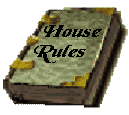
House Rules: Since the Darkening, many things behave differently now upon Althéa in terms of in-game mechanics and House Rules. The Darkening represented the removal of the three coloured moons that once orbited Althéa, which means arcane magic in particular has undergone a big change. And with the introduction of the Life Essence, not only is there a new way to practice magic, but there are also new ways for many other interactions as well.
INTRODUCTION (HOUSE RULES)
This section provides the player with extra information about the rules and mechanics used in the new era of The Althéa Campaign since the time of The Darkening. It will continue to be updated as I design and add new mechanics to the game. The new era upon Althéa is called The Age of New Life and for the time being, all modules designed for this era will use NWN2 as the game platform. This is because NWN2 generally offers more useful facilities for our group's style of gaming than NWN1.
I will try to arrange the various House Rules into sections that make information easier to find. Use the content bar on the left to help navigate to particular information you are after. If you cannot find an answer, then please leave a comment on the Blog under the latest entry.
WORK IN PROGRESS (SUBJECT TO ALTERATION)

The Life Essence is a new essence, unique to the World of Althéa. Its placement in the grand scheme of things was determined in times past, but has only been discovered upon Althéa in the latest age. For more information on its background, see Magik Through The Ages, part of The History section.
Essences have become prominent upon Althéa since The Darkening. Many players will already be familiar with the various essences already available and how they can be used. The Life Essence, however, is a new type and one that can be used more readily and for more purposes than the others.
A PC's Life Role (or a party's Life Role if playing more than one character or in a party with other players) determines how a PC acquires Life Essences. There are basically two roles from which the players can determine how to play their character: As a Harvester or as a Channeler. The former reflects a dark-nature, greedy, evil method of collection, and the latter a kind-heart, merciful, good means. The method of play is established fairly early in the campaign, but a player can change their character's path through play. More of this is learned through playing the first adventure: The Scroll (The First Day).
Most of the time, Life Essences must be gathered from recently killed creatures, normally through combat. A life that has been cut short this way has its Life Essence released upon death, which then has the chance of being intercepted before it enters the spirit world. Sometimes, however, Life Essences may gather in other ways. Such collections resemble a small glowing smooth crystal. (See images.) When the remains of a recently killed creature are examined, a knowledgeable PC may notice Life Essences still gathered around the body referred to as "trapped" or "bound" essence. Most of the time, however, the essence will escape to the spirit world before it is found. The moral nature of the finder determines what they do next:

Good aligned characters will help "channel" the Life Essence onto its final resting place, and be rewarded with a portion of the essence they helped to free. Evil aligned characters will try to "harvest" the entire Life Essence for themselves, although there is no guarantee they will succeed.
On rare occasions, an adventurer may come across a creature that was carrying (non-bound) Life Essences. Most of the time, however, if the creature is intelligent or wise enough, they would use the Life Essence to help prevent its own demise before the adventurer can relieve them of it.
The Life Essence can be used in a number of ways. Actual usage will be discovered through play, although it should be noted that:-
-
It is a protective force.
-
It is a restorative force.
-
It is a creative force.
There will be some limitations of what you can achieve with it according to the PC skills, but all PCs will gain some benefits for having collected Life Essence. Here are some examples:
-
1st Level (All PCs) - Soul Protection. (The PC is protected against untimely death.)
-
1st Level (All PCs) - Enhance Life. (Life Essence traded for real experience - Increase XP.)
-
1st Level (All PCs) - Empower Attributes. (PC can recover lost or increase attributes.)
-
1st Level (Craft Skill PCs) - Maintain Equipment. (Craft skill required.)

Alignment choices and faith play an important role in the Althéa Campaign, especially to the cleric class that relies upon their god and holy book to acquire prayers to help them during their adventures. When a PC joins a game, their race, class and alignment helps to dictate what god they will follow upon entering the game:
1) Human non-clerics: Do not start with any faith and enter the World of Althéa with no god and their deity is marked as, "SEARCHING FOR FAITH". (Image left.)
2) Human clerics: Enter the game following one of the human gods of the World of Althéa, according to their alignment. Eg.Good clerics follow BORAN. (Image below left.)
3) Non-humans (any class): Enter the game following one of the gods they chose at the time of PC creation. (Image below right.)


HOLY BOOKS & LOSING THE FAITH: Cleric classes receive a Holy Book in accordance to the deity they follow. These books are invaluable to the cleric, as without them, they are unable to study for the following day prayers, and will be limited to basic orisons only. The ability to study their holy book is also taken away from the cleric by their god if they should fall away from the faith due to an alignment change. Therefore, a player should take care of any actions they perform with their PCs that changes the alignment of the party if they have a cleric in the group.
REGAINING THE FAITH: If a cleric does lose their faith due to inappropriate behaviour, then they can atone for their actions by a sacrifice of value at an appropriate aligned altar. Altars come in three types: Good, Neutral and Evil. All three altars reward the PC for a sacrifice of sufficient value, but only Good and Evil altars will change the alignment in an obvious way. NB: Every member of a party will have their alignment altered if a PC from the group makes a sacrifice. Also, some acts performed by the party may help to shift alignment in the appropriate direction as well. A cleric PC must have the correct alignment and possess a Holy Book before they can request prayers from their god once more.
CHANGING FAITHS: It is possible to change faiths throughout the game. This action affects clerics the most, as they will have to find a new Holy Book and/or correct their alignment for the god in question.
FAVOURED SOUL: The Favoured Soul class is not affected by changing faith in the same way as clerics.




